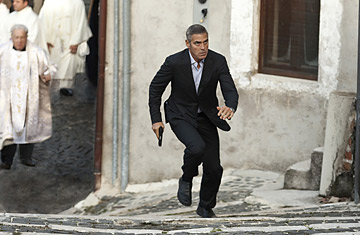
A scene from The American
George Clooney plays an imperiled high-class criminal named Jack in The American, surely the dreariest thriller of the year. Jack, who also goes by the names Edward and Henry, is a solemn sort, with no family or anything approaching a friend except perhaps his icy-eyed boss Pavel (Johan Leysen). Assorted bloodthirsty Swedes are after him to exact revenge. For what? The movie is deliberately vague, an obfuscation presumably intended to intrigue us. Instead, its emotional remoteness is contagious: If the film insists on being cryptic, why should we respond? We're trained by thrillers like these to bite our nails every time Jack sets foot in a dark alley, but even played by the sensationally likable Clooney, Jack's well-being never feels like an urgent matter.
The movie is also vague about his line of work. In the film's opening sequence, a shoot-out set in snowy Sweden, Jack displays deadly accuracy and just the kind of quick-thinking, self-protective reactions a cold-blooded assassin needs, but when the action moves to the Abruzzo region of Italy, he becomes a kind of handyman of death. Pavel, having instructed him to lay low in an isolated mountain town and make no friends (he'd made that mistake in Sweden), presses him to take one last gig. He doesn't even have to pull the trigger this time, Pavel tells him; instead, his mission is to craft a customized sniper rifle for the beautiful, enigmatic Mathilde (Thekla Reuten, who played the hotel keeper in In Bruges, a far more entertaining portrait of hit-man angst), a woman with very specific requirements for her weapon.
In his rented apartment in Castel del Monte, where the sun rarely shines, Jack rolls pieces of this gun around on a table and pounds them in tune to the church bells bonging about him; it's like watching a cooking show brought to you by Smith & Wesson, hosted by a thoughtful, albeit morose, chef. (Clooney hasn't been this glum on-screen since Steven Soderbergh's ponderous 2002 remake of Solaris.) The epicurean gunsmithing unfolds over roughly half of the movie, and, while the pacing leaves something to be desired, this is the first time I've ever felt the urge to eat a gun.
When Jack isn't working on the rifle, he's either hanging out with Father Benedetto (Paolo Bonacelli) or visiting a local prostitute, Clara (Violante Placido). The former is one of those buttinskys with an apparent urge to save Jack's soul, although Clooney's furrowed brow is the only outward indication that Jack's is in any jeopardy. As for Clara, not to cast aspersions on the good whores of Abruzzo, I question the plausibility of Jack finding a hooker there who looks like a supermodel and is dying to go on non-work-related dates with him. Neither of these supporting characters is given any basis for developing a deeper relationship with Jack — he gives them nothing — yet they seem to care so much. He even tells Clara, rising from her bed after some graphic lovemaking (graphic for Clooney anyway, who tends to be modest on-screen) that she can quit faking it. "I come here to get pleasure," he tells her. "Not to give it." Be still, my beating prostitute's heart of gold!
Anton Corbijn directed from a screenplay by Rowan Joffe, based on Martin Booth's critically lauded novel A Very Private Gentleman. Corbijn's 2007 film Control, a biopic of the British new-wave band Joy Division, took an offbeat, nihilistic approach to the genre — a gamble that paid off in looks, style and memorable performances (Sam Riley was wildly compelling as singer Ian Curtis). In The American, you can see Corbijn reaching to put an equally offbeat twist on the thriller genre, but the goal eludes his grasp. The movie looks lovely, but it feels drained of life. And so does its star. Clooney is by nature a highly accessible actor. In the film, it seems the main goal, oddly, is to make him inaccessible. There may also have been an editing problem; vital pieces of the story appear to have been left on the cutting-room floor. Certainly I learned more about our protagonist's relationship with Clara and his line of work from reading synopses of A Very Private Gentleman on Amazon. The guy on the page sounds like a character worth investing in, someone you'd hope could find a better future. But it's hard to root for the guy on the screen, despite all the mortal danger The American throws at him; he seems so dead inside already.
